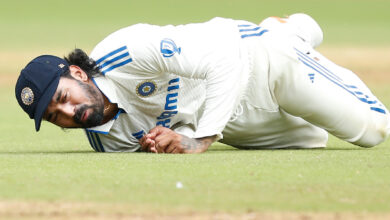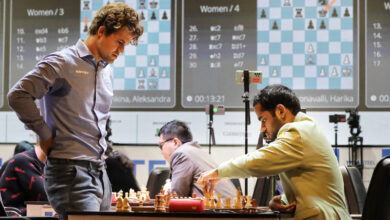There can’t be another Salim Durani: Flamboyant cricketer, movie star, nice guy, ultimate entertainer

Salim Durani played just 29 Tests, took 75 wickets, and scored 1202 runs. But Durani was never about numbers. He was Indian cricket’s ultimate entertainer, someone who always played for the galleries. He was a flamboyant all-rounder known for hitting sixes on demand, a temperamental spinner who on his day could remove the best batsman — the story of him demanding Ajit Wadekar to give him the ball and proceeding to knock out Garry Sobers is often spoken about.
Myths about him abound: from his insane popularity, his colourful personality that allowed him to be at ease with maharajas, movie stars as well as the common man. His love for alcohol, Gold Flake cigarettes and good life, his financial crisis just added to his image of a carefree character who lived his life to fullest. Those who knew him well would often say, “Salimbhai mast rehte hain hamesha.”
On April 2, 2023 Salimbhai’s “mast life” ended. Born in Kabul, Afghanan, he lived all his life in Jamnagar, a city that has a statue of India’s great Vinoo Mankad at a busy traffic junction and was, back in the day, ruled a cricketing legend Ranjitsinhji. Durani was 88. Saurashtra Cricket Association, expressing its grief in a press statement, said “Salimji left for heavenly abode today early this morning at Jamnagar”. It is learnt Durani was not in the best of health after he broke his thigh bone in a fall in January this year.
Easily one of the most colourful cricketers of India – Salim Durani.
Rest in Peace. ॐ शांति 🙏 pic.twitter.com/d5RUST5G9n
— Ravi Shastri (@RaviShastriOfc) April 2, 2023
Making his Test debut in 1960, Durani’s dash and aggressive play made him an instant hit with the fans. His rakish good looks attracted the attention of the film folks around the country. Collars up, high cheekbones, wavy hair, sparkling eyes and a swooning smile, Durani ticked all the boxes.
“Hero banoge?” Dev Anand, the Bollywood icon and his friend, asks him. The “dashing” Parveen Babi would soon become his heroine in a movie, and later become a good friend. He mingles with Ashok Kumar and Meena Kumari. In Chennai, he is in the company of Sivaji Ganesan, Gemini Ganesan, and Savithri. From industrials to politicians to maharajas, everyone wants a piece of him. Shopkeepers often refuse to take money from him. The aam janta loves him to bits.
India’s first Arjuna Award winning cricketer and a man who hit sixes on public demand, Salim Durani.
Om Shanti. Heartfelt Condolences to his family , friends and loved ones. pic.twitter.com/DwdKamlxjy
— VVS Laxman (@VVSLaxman281) April 2, 2023
In 2016, I had a chance to meet Durani at Jamnagar. He was at the home of his niece where he has been for the last year due to health concerns. “Market pahunchkar, kisi ko bhi poochna Iqbal Lala ka ghar,” Salimbhai had said. As it turns out, it would have been far easier if we had told the auto driver ‘Salimbhai’, but as we learn in the next few hours, he prefers talking about others.
You nudge him about the story about how he once covered a shivering Sunil Gavaskar with his coat on a train journey, bore the cold himself but helped the young man sleep, and he shrugs and tells you another tale, with a self-deprecating tw.
An old beggar woman had approached him on a winter night, and Salimbhai melted. “I removed my sweater, the official Rajasthan cricket sweater, and gave her 10 rupees, a sizable amount in those days. As you smile, he reveals the end. “When we got into the cab, someone told me ‘bhai, you would be in trouble, you have given away the official sweater, the one in Rajasthan colours’. I was tense, you know! And told them “gaadi ghumao” and actually went in search of the lady to get the sweater back! She had gone then.” Laughter fills the room, a common occurrence in his presence.
With #Salimdurani sir 👊🏽 pic.twitter.com/vCmGcIZpPh
— Vijender Singh (@boxervijender) October 18, 2020
Nostalgia, the greatest wrinkle-remover, took him back to his youth. “There was this match against England. I hit Tony Locke for two sixes — First over deep mid-on and second I lifted him straight on to the first-tier balcony at CCI!” His right arm stretches out, eyes jerk up. “They had a fast bowler who bounced me with the second new ball.” The arms do a pull shot, the eyes roam again, and he says, “it went into the crowd”.
His relationship with crowds is part of cricket lore. When the former chief justice of India RM Lodha was younger, he remembers a fun day spent in Kolkata, the crowd demanding sixes from Durani and being obliged. “My game was like that. Sometimes I would hear the crowd chant and get into the mood,” he laughs.
His niece had offered juice but he says no. “Thodi sardi hai,” he had said. But that didn’t stop him from lighting up a cigarette, crossing his legs and blowing out more stories.
You have not seen that sportsperson, but you develop a great sense of admiration and wish you were lucky to see that sportsperson in action. Very rarely you become a fan boy of someone just hearing about him/her. That is what #SalimDurani did to you. #RIP Salim Bhai.
— W V Raman (@wvraman) April 2, 2023
“ I read, watch sports — cricket, football, and if any good movies are on.” The last one he saw on the telly had featured Akshay Kumar and Suniel Shetty. “Shetty accha aadmi hai, he drops at times. Tom Alter bhi aata hai. The other day, Ajay Jadeja was here with Ishant Sharma.”
“I just went the flow in life, Zindagi jaise chali, waise chalney diya.” There were a few crises in his life and he just shrugs at the mention. “Life matlab there will be challenges. I had a few but didn’t lose my balance.” The recent financial grants from the BCCI to former cricketers had been a help, and also the pension he got from the board.
In the evenings, if his cousin or grandson Yasin weren’t free, he would take an auto and go to Summair Club. When the knee was better, he would play billiards. “I can still walk, slightly slowly but there is no great problem. At times, I walk to the club; just that I need a break in the middle,” he would say.
Around the time of the meeting, he had met his old friend Sobers. “What a player he was. And itna simple aadmi. Rohan (Kanhai) I hear runs a pub. I haven’t seen him in a while; he used to come often to India before but no longer.”
Cricketing stories kept tumbling out. In his penultimate Test, played against England in Chennai, India were set a target of 86 but wickets started to tumble. When they were 51 for 4, he was joined Tiger Patuadi and a small partnership was built. Soon, he decided to go for some quick runs.
“They had a spinner (Norman) Gifford. I lifted (he never uses words like hit, it was always ‘lifted’) him for a big six over midwicket. He was angry, walked across and said, “Duree, you hit a cross-batted shot. Play straight!” I told him, “Giffy, never mind if it was a cross-batted shot, we now just need 20 runs, go get the ball!” Though he eventually fell for 38, India went on to seal the game.
Another cigarette had died in his hands, the memories were fresh though. On the instructions of Lala Amarnath, a selector then, Durani, and a few other youngsters, were travelling with the team to gain exposure. On one evening, Amarnath had a strange request. “‘Don’t stay out late tonight. Come back to the room’. I thought he must be telling me to stop going to parties, and I came back early. He came to my room, and said, ‘be ready, you will be playing tomorrow. Jasu Patel is not feeling well.’ I couldn’t sleep that night. I was tossing and turning till 4 am, and there were nerves when I took the field also. They sent me at No 10.”
He remembered the first run, off the first ball he faced. “It was the great Ray Lindwall and I ran a single. I remember how I got out also, I was playing well but went for a pull shot but didn’t connect well”. Later, as I returned to my hometown, people said, “arre Lindwall ki pehli ball mey run le liya!” Laughter.
The names reel out —legendary cricketers, club players, adminrators and even kings — and there is not a single negative thing he had to say about anyone. It’s easy to understand why the cricketing fraternity loved and respected Salimbhai.
He moved with kings and paupers with remarkable ease. Sometimes in Jamnagar, he would be at the back of the Lambretta scooter of his cousin, at times in a local train in Mumbai, on a pillion of a bike of a local football coach in Ahmedabad, or in a posh car with the maharajah of Jamnagar. A genteel soul from a gone era, and as that cliché goes, they don’t make them like him anymore.







